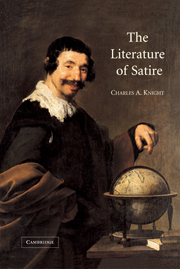Conclusion
Published online by Cambridge University Press: 22 September 2009
Summary
Karl Kraus brings us to the center of the satiric enterprise, where the triad of words, ideas, and actuality operates as both object and vehicle of scrutiny. Gaps in the relationships within the triad reveal the meaninglessness of language or the evil of the culture that uses it. Disjunctions created by the satirist's manipulation of the triad force the audience to look at the world and ideas about it from a new perspective. Kraus's location of this center enables, by way of conclusion, a look back at the depiction of satire here and outward from the center to the concentric frames that satire incorporates. Kraus's interest in language, specifically with public language, and more specifically still with the language of the press, is a manifestation of the satiric press's concern with whether communication has properly taken place at all. As I argued in chapter 7, the debates over French failure to disarm Dunkirk following the War of Spanish Succession suggest a concerted (although probably not organized) attack on each element of the communications model set out by Roman Jakobson. The author is incompetent; the message is mistaken; the audience is deluded; the context is irrelevant; the code is solecistic or tautological; the satiric warning is itself a danger.
Satire manipulates this communications model through its characteristic adoption, parody, and transformation of pre-existent genres. Its independence of the genres that it uses proclaims its pre-generic nature.
- Type
- Chapter
- Information
- The Literature of Satire , pp. 270 - 272Publisher: Cambridge University PressPrint publication year: 2004
- 1
- Cited by



